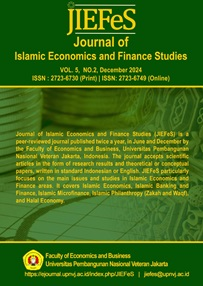Macroeconomic Variables and the Indonesian Sharia Stock Index
DOI:
https://doi.org/10.47700/jiefes.v5i2.7765Keywords:
Macroeconomics, Indonesian Sharia Stock Index, Exchange Rate, Money SupplyAbstract
Macroeconomic development significantly impacts the movement of the Indonesian Shariah Stock Index (ISSI). This study analyzes the effects of five macroeconomic variables, namely exchange rate (ER), inflation (INF), BI Rate (BIRATE), oil price (OP), and money supply (MS) on ISSI using quantitative data from January 2015 to December 2022 and the Vector Error Correction Model (VECM) framework. The analysis revealed that in the short term, ER, INF, BIRATE, OP, and MS did not significantly affect ISSI. However, in the long-term, ER, BIRATE, OP, and MS significantly impact ISSI, whereas INF remains insignificant. Among these variables, ER and MS had the most substantial influence on ISSI. These findings underscore the importance of macroeconomic stability in shaping ISSI's long-term performance, providing valuable insights for policymakers and investors aiming to navigate the dynamic relationship between macroeconomic factors and Islamic financial markets. Maintaining macroeconomic stability is essential for supporting the growth and resilience of the Islamic financial market. Policymakers should focus on effectively managing exchange rates and money supply while fostering a stable economic environment to enhance ISSI performance.
References
Alam, M., Akbar, C.S., Shahriar, S.M. & Elahi, M.M. (2017), The Islamic shariah principles for investment in stock market, Qualitative Research in Financial Markets, 9(2), 132-146. https://doi.org/10.1108/QRFM-09-2016-0029
Ardana, Y. (2016). Variabel Makroekonomi Terhadap Indeks Saham Syariah Indonesia (Periode Mei 2011 – September 2015 dengan Model ECM). Media Trend, 11(2), 117. https://doi.org/10.21107/mediatrend.v11i2.1441
Arfandi, S., & Rahayu, S. E. (2022). Pengaruh Indeks Saham Syariah Jepang (JIJP) dan Indeks Saham Syariah Malaysia (DJMY25D) Terhadap Indeks Saham Syariah Indonesia (ISSI). POINT: Jurnal Ekonomi dan Manajemen, 4(1), 53–66. https://doi.org/10.46918/point.v4i1.1394
Asutay, M., Aziz, P.F., Indrastomo, B.S. & Kharbari, Y. (2023). Religiosity and Charitable Giving on Investors’ Trading Behaviour in the Indonesian Islamic Stock Market: Islamic vs Market Logic. Journal of Bussiness Ethics, 188, 327–348. https://doi.org/10.1007/s10551-023-05324-0
Asmy, M., Rohilina, W., Hassama, A., & Fouad, M.D (2009). Effects of Macroeconomic Variables on Stock Prices in Malaysia: An Approach of Error Correction Model. MPRA: Munich Personal. https://mpra.ub.uni-muenchen.de/id/eprint/20970
Badan Pusat Statistik (BPS). (2023). BI Rate, 2023. https://www.bps.go.id/Id/Statistics-Table/2/Mzc5IzI=/Bi-Rate.Html.
Bahloul, S., Mroua, M., & Naifar, N. (2017). The impact of macroeconomic and conventional stock market variables on Islamic index returns under regime switching. Borsa Istanbul Review, 17(1), 62-74. https://doi.org/10.1016/j.bir.2016.09.003
Bank Indonesia. (2022). Bank Indonesia. https://www.bi.go.id/Id/Default.Aspx.
Bursa Efek Indonesia. (2022). Indeks Saham Syariah. Https://www.idx.co.id/Id/Idx-Syariah/Indeks-Saham-Syariah
Chotib, E., & Huda, N. (2020). Analisis pengaruh variabel ekonomi makro terhadap Indeks Saham Syariah Indonesia (ISSI) periode 2016 - 2019. JEBA (Journal of Economics and Business Aseanomics), 4(1). https://doi.org/10.33476/j.e.b.a.v4i1.1235
Fathurrahman, A., & Widiastuti, R. A. (2021). Determinan Indeks Saham Syariah Indonesia. Islamic Banking : Jurnal Pemikiran an Pengembangan Perbankan Syariah, 7(1), 179–194. https://doi.org/10.36908/isbank.v7i1.309
Febriandika, N. R., Hakimi, F., & Awalliyah, M. (2023). Contagion and spillover effects of global financial markets on the Indonesian sharia stock index post-covid-19. Innovations, 20(3), 35-47. http://dx.doi.org/10.21511/imfi.20(3).2023.04
Fianto, B.A., Shah, S.A.A. and Sukmana, R. (2023). Time varying intra/inter quantile developing relationship of Islamic stock returns: empirical evidence from Indonesia using QBARDL, Journal of Modelling in Management, 18(6), 1696-1716. https://doi.org/10.1108/JM2-12-2021-0310
Firdausi, A. N., Fahmi, I., & Saptono, I. T. (2016). Pengaruh Indeks Harga Saham Regional ASEAN dan Variabel Makroekonomi terhadap Indeks Harga Saham Syariah Indonesia (ISSI). Al-Muzara’ah, 4(2), 76–96. https://doi.org/10.29244/jam.4.2.76-96
Habib, M., & Islam, K. U. (2017). Impact of macroeconomic variables on islamic stock market returns: Evidence from NIFTY 50 Shariah Index. Journal of Commerce and Accounting Research, 6(1), 37. https://ssrn.com/abstract=3804095
Hassan, M.K., Aliyu, S., Saiti, B. & Abdul Halim, Z. (2020), A review of Islamic stock market, growth and real-estate finance literature, International Journal of Emerging Markets, 16(7), https://doi.org/10.1108/IJOEM-11-2019-1001
Juniadi, A., Wibowo, M. G., & Hasni, H. (2021). Pengaruh Variabel Ekonomi Makro terhadap Indeks Saham Syariah Indonesia (ISSI) Periode 2014-2019. JEBI: Jurnal Ekonomi dan Bisnis, 24(1), 17–29. http://dx.doi.org/10.31941/jebi.v24i1.1364
Kamal, M., Kasmawati, Rodi, Thamrin, H., & Iskandar. (2021). Pengaruh Tingkat Inflasi dan Nilai Tukar (Kurs) Rupiah terhadap Indeks Saham Syariah Indonesia (ISSI). Jurnal Tabarru’ : Islamic Banking and Finance, 4(2), 521–531. https://journal.uir.ac.id/index.php/tabarru/article/view/8310
Katmas, E., & Indarningsih, N. A. (2022). The Effect of BI Interest Rate, Exchange Rate, and Inflation on The Indonesian Sharia Stock Index (ISSI). Indonesian Interdisciplinary Journal of Sharia Economics (IIJSE), 5(2), 769–783. https://doi.org/10.31538/iijse.v5i2.2144
Kennedy, K., & Nourizad, F. (2016). Exchange rate volatility and its effect on stock market volatility. International Journal of Human Capital in Urban Management, 1(1), 37–46. http://www.ijhcum.net/article_19121_a4c266151330aafd7795dda447eab298.pdf.
Masrizal, Sukmana, R., Al Mustofa, M.U. & Herianingrum, S. (2021), Can country risks predict Islamic stock index? Evidence from Indonesia, Journal of Islamic Accounting and Business Research, 12(7), 1000-1014. https://doi.org/10.1108/JIABR-04-2020-0127
Melvin, J., Hanryono, & Riwoe, J. C. (2018). Pengaruh ekonomi makro terhadap indeks saham Syariah di Indonesia pada periode 2014-2017. Journal of Accounting and Business Studies, 3(2), 43–60. https://doi.org/10.61769/jabs.v3i2.316
Mubarok, F., Al Arif, M. N. R., & Mufraini, M. A. (2020). The stability of the Indonesian Sharia stock index to economic shocks. IQTISHADIA, 13(2), 138. https://doi.org/10.21043/iqtishadia.v13i2.7748
Mohamad Shafi, R. & Tan, Y.-L. (2023). Evolution in Islamic capital market: A bibliometric analysis, Journal of Islamic Accounting and Business Research, 14(8), 1474-1495. https://doi.org/10.1108/JIABR-04-2022-0106
Mohnot, R., Banerjee, A., Ballaj, H. & Sarker, T. (2024), Re-examining asymmetric dynamics in the relationship between macroeconomic variables and stock market indices: empirical evidence from Malaysia, Journal of Risk Finance, 25(1), 19-34. https://doi.org/10.1108/JRF-09-2023-0216
Nasir, M., Fakhriah, F., & Ayuwandirah, A. (2016). Analisis variabel makroekonomi terhadap indeks saham Syariah Indonesia dengan metode pendekatan Vector Autoregression. Ekonis: Jurnal Ekonomi dan Bisnis, 15(1), 53–63. https://e-jurnal.pnl.ac.id/index.php/ekonis/article/view/268)
Nofrianto, & Arif, F. M. (2023). Domestic and international macroeconomic variables on Indonesian Sharia Stock Index with Vector Error Correction Model Approach. AL-MUZARA’AH, 11(1), 31–46. https://doi.org/10.29244/jam.11.1.31-46
Otoritas Jasa Keuangan (OJK). (2023). Saham Syariah. https://Ojk.Go.Id/Id/Kanal/Syariah/Data-Dan-Statistik/Saham-Syariah/Default.Aspx.
Qoyum, A., AlHashfi, R.U., Hanafi, M.M., Mohd Thas Thaker, H. & Effendi, J. (2024), Resilience of ethical and nonethical stock during COVID-19 crisis: a case of Indonesia Stock Exchange, Journal of Islamic Accounting and Business Research, Vol. ahead-of-print No. ahead-of-print. https://doi.org/10.1108/JIABR-03-2023-0113
Rachmawati, M., & Laila, N. (2015). Faktor makro ekonomi yang mempengaruhi pergerakan harga saham pada indeks saham Syariah Indonesia (ISSI) di Bursa Efek Indonesia (BEI). Jurnal Ekonomi Syariah Teori Dan Terapan, 2(11), 928. https://doi.org/10.20473/vol2iss201511pp928-942
Raza Rabbani, M., Hassan, M.K., Jamil, S.A., Sahabuddin, M. & Shaik, M. (2024), Revisiting the impact of geopolitical risk on Sukuk, stocks, oil and gold markets during the crises period: fresh evidence from wavelet-based approach, Managerial Finance, 50(3), 514-533. https://doi.org/10.1108/MF-12-2022-0587
Rivai, V., & Buchari, A. (2009). Islamic economics: ekonomi syariah bukan opsi, tetapi solusi! Bumi Aksara.
Rokhaniyah, S. (2020). Pengaruh indikator fundamental dan makro ekonomi terhadap harga saham yang tergabung dalam ISSI. Akutansi Dewantara, 4(1), 70–80. https://doi.org/10.26460/ad.v4i1.5840
Sari, N. P., & Latief, A. (2020). Pengaruh inflasi dan jumlah uang beredar terhadap indeks saham Syariah Indonesia (ISSI). Borneo Student Research, 1(3), 2130–2139. https://journals.umkt.ac.id/index.php/bsr/article/view/868
Setyani, O. (2017). Pengaruh inflasi dan nilai tukar terhadap indeks saham Syariah Indonesia. Islamiconomic: Jurnal Ekonomi Islam, 8(2). https://doi.org/10.32678/ijei.v8i2.76
Soyan, S., Yunus, A. R., & Indrawati, R. (2023). The effect of macroeconomics and world oil prices on the Indonesian Sharia stock index for 2018 – 2022. At-Tawazun: Jurnal Ekonomi Islam, 3(2), 1–19. https://doi.org/10.24252/attawazun.v3i2.37769
Suciningtias, S. A., & Khoiroh, R. (2015). Analisis dampak variabel makroekonomi terhadap indeks saham Syariah Indonesia (ISSI). 2nd Conference in Business, Accounting, and Management, 2(1), 398–412. https://jurnal.unissula.ac.id/index.php/cbam/article/view/323
Sudarsono, H. (2018). Indikator makroekonomi dan pengaruhnya terhadap indeks saham Syariah di Indonesia. Esensi: Jurnal Bisnis dan Manajemen, 8(2). https://doi.org/10.15408/ess.v8i2.7219
Tripuspitorini, F. A. (2021). Analisis pengaruh inflasi, nilai tukar rupiah, dan BI-rate terhadap harga indeks saham Syariah Indonesia. Jurnal MAPS (Manajemen Perbankan Syariah), 4(2), 47–56. https://doi.org/10.32483/maps.v4i2.50
Tripuspitorini, F. A., Setiawan, S., & Setiawan, N. J. (2021). Pengaruh faktor makroekonomi terhadap harga indeks saham syariah menggunakan pendekatan metode vecm. INOVASI: Jurnal Ekonomi Keuangan dan Manajemen, 17(2), 365–376. http://journal.feb.unmul.ac.id/index.php/INOVASI
Usman, B., Hasnam, M. G., Nurazi, R., & Aujirapongpan, S. (2024). Exploring investor attention in Shariah markets, macroeconomic influences, and corporate performance: Insights from Indonesia. Social Sciences & Humanities Open, 10, 101015. https://doi.org/10.1016/j.ssaho.2024.101015
Widarjono, A. (2018). Ekonometrika: Pengantar dan aplikasinya disertai panduan Eviews (Kelima). UPP STIM YKPN.
Downloads
Published
Issue
Section
License
Copyright (c) 2024 Heri Sudarsono, Latifatunnisa

This work is licensed under a Creative Commons Attribution 4.0 International License.
Authors who publish with this journal agree to the following terms:
- Authors retain copyright and grant the journal right of first publication with the work simultaneously licensed under a Creative Commons Attribution 4.0 International License that allows others to share the work with an acknowledgment of the work's authorship and initial publication in this journal.
- Authors can enter into separate, additional contractual arrangements for the non-exclusive distribution of the journal's published version of the work (e.g., post it to an institutional repository or publish it in a book), with an acknowledgment of its initial publication in this journal.
- Authors are permitted and encouraged to post their work online (e.g., in institutional repositories or on their website) before and during the submission process, as it can lead to productive exchanges, as well as earlier and greater citation of published work.

This work is licensed under a Creative Commons Attribution 4.0 International License.











